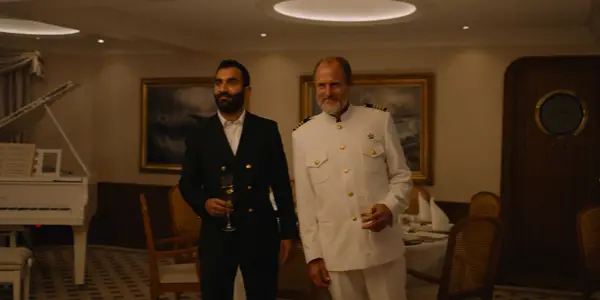There is a clear absurdity at the heart of modern capitalism. With an increasingly baffling level of inequality, a growing inevitability of ecological collapse, and a simultaneous embrace of mindless excess from the top 1%, it’s hard not to feel powerless, confused and enraged by the status quo. The approach of some filmmakers has been to incisively detail and satirise these dynamics, bringing a sharp, empathetic, and even educational eye to the class divisions of the modern world. Indeed, to varying extents, films like Parasite, The Big Short, and Sorry to Bother You have received plaudits for their observations. But, there is not always a necessity for such sharp commentary in films about class, economics, or politics – after all, this is the job of analysts and politicos.
As is demonstrated by Ruben Östland’s Triangle of Sadness, there is also a place for caricature and blunt, coarse catharsis. Just as there is space for profundity and insight, there is also an understandable hunger for something less cerebral; something that simply acknowledges and laughs at the bleak state of things. To briefly detail the plot (though it’s best to go in totally blind), Triangle of Sadness follows a group of obscenely wealthy individuals on a private yacht as their trip becomes derailed by an increasingly absurd series of events. Rather than a deeply thoughtful exploration of social class, Östlund’s priority is in first humiliating his uber-rich characters before gleefully subjecting them to the ultimate indignity of exploitation and class-role-reversal. It might not be the most substantive of satires but its biting observations of social class, its caustic humour, and its third-act subversion certainly resonate with the audience.
Laughing to Cope
There is perhaps a defeatism to Östlund’s vision; a sense that when faced with such an insurmountable opposition, all one can do is resort to acid mockery and short-lived subversion. Indeed, much of the film would be painful if it wasn’t so funny. By the brilliantly constructed final moments, this defeatism becomes concrete.

Östlund seems to suggest that the beast (in this case the wealthy and powerful) cannot be tamed or indeed overthrown but only prodded from afar. Nowhere is this sentiment better encapsulated than by the perpetually drunk and politically despondent captain of the ship, portrayed with weary acceptance by Woody Harrelson.
Beyond Satire
However, the potentially divisive social commentary is just one facet of a film filled with terrific performances, an acerbic script, and a consistently unpredictable sense of humour. When these things come together under Östlund’s meticulous direction, it creates some of the funniest moments of this year’s festival. Special mention here should go to several scene-stealing line deliveries from Vicki Berlin’s character, the chirpy wife of a successful weapons manufacturer.
Another highlight of the film comes from perhaps the least cartoonish characters, Yaya and Carl, played with precision and nuance by Charlbi Dean and Harris Dickinson. Through this “influencer” couple, Östlund channels a more grounded discussion of gender-roles, relationship dynamics and what he has called the “currency of beauty”. Indeed, in the ceaseless drive to commodify, even the self is fair game. From their introduction as a couple in a brilliantly protracted dinner sequence, Dickinson’s sensitive, talkative Carl proves an amusing foil to the cold and calculated Yaya.
Elsewhere, the third act delivers a hilarious, embittered, and quietly poignant performance from Dolly de Leon. Much like Dickinson and Dean, de Leon brings a piercing humanity to her character, elevating the role beyond the caricatures that surround her. Her story and its dark ending may sit with the viewer long after having watched.
Conclusion:
On some level, much of Triangle of Sadness feels like a cinematic equivalent of the anti-establishment political cartoons that were once so pervasive in cultural discourse. Take for instance the nauseating sequence of passengers alternately vomiting and downing expensive champagne for relief, or the sight of Zlatko Burić’s weeping oligarch removing jewellery from his wife’s corpse. There is an immediacy and bluntness to this brand of satire that recalls the simplicity of the political cartoon; a compression of an idea into an easily comprehensible and often ridiculous image. Though it may not work for all, Östlund’s unpredictable and refreshingly uncivil takedown of the wealthy and beautiful is well worth a watch.
Have you seen Triangle of Sadness? What did you think? Let us know in the comments below!
Triangle of Sadness opened in limited theaters on October 7, 2022!
Watch Triangle of Sadness
Does content like this matter to you?
Become a Member and support film journalism. Unlock access to all of Film Inquiry`s great articles. Join a community of like-minded readers who are passionate about cinema - get access to our private members Network, give back to independent filmmakers, and more.